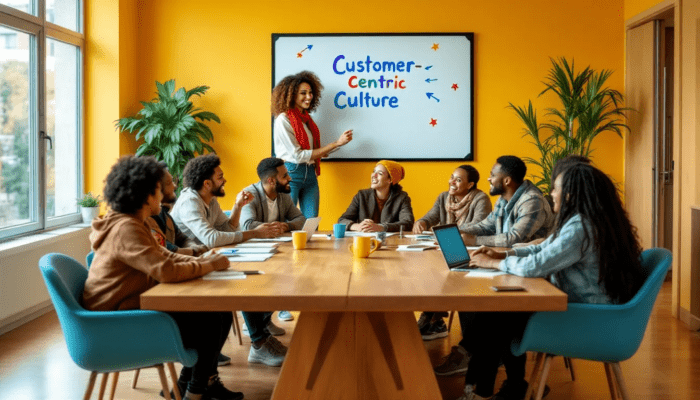Are you looking to build and maintain relationships with customers? This guide will show you how. Discover strategies for personalizing interactions, using CRM software, and appreciating your customers. Learn how to build and maintain customer relationships while keeping these connections thriving through active listening and consistent communication.
Key Takeaways
- Building and maintaining customer relationships is essential for business success, as they foster trust, loyalty, and satisfaction.
- A multi-faceted approach enhances customer relations and retention, including personalized interactions, effective customer service, and leveraging technology.
- Empowering employees and creating a customer-centric culture is critical for delivering exceptional experiences and maintaining customer loyalty.
Mastering How to Build and Maintain Relationships with Customers

Building and maintaining customer relationships is the cornerstone of any successful business. Consistent customer interactions build trust, a critical factor in influencing purchasing decisions. Excellent customer service enhances brand loyalty, encouraging satisfied customers to return and building customer relationships.
During economic challenges, retaining existing customer relationships becomes more important than acquiring new ones. Long-term, mutually beneficial relationships based on trust define positive customer relations and are essential for sustainable business growth. Fostering strong customer relationships can increase loyalty and satisfaction.
A robust customer relations strategy boosts acquisition while enhancing loyalty and satisfaction. Understanding customers and creating tailored experiences is vital for effective customer relationship management. Recognizing customer sentiments when brand relationships are weak is crucial for improving customer relations.
Building and maintaining customer relationships requires a multifaceted approach. Strategies such as leveraging technology, personalizing interactions, and showing appreciation ensure long-lasting customer loyalty and satisfaction.
Introduction
Customer relationship management is a crucial aspect of business success. It involves building and maintaining long-term customer relationships, meeting their needs, and exceeding expectations. This process involves various roles, from customer service representatives interacting with customers daily to customer relations managers strategizing and overseeing these interactions.
Successful customer relationship managers typically have a solid educational background, customer-facing experience, and a deep understanding of customer relations strategies. The financial rewards in this field reflect its importance, with average salaries varying based on roles and responsibilities.
This blog post will delve into the strategies and tools needed to master customer relationship management and ensure your business thrives in a competitive market.
Understanding Customer Relationships
Strong customer relationships boost acquisition, loyalty, and satisfaction. Maintaining relationships is crucial during economic turbulence since attracting new customers becomes challenging. Positive customer relations involve long-term, mutually beneficial relationships built on trust.
Strong customer relations contribute significantly to business success by creating loyal customers and enhancing brand credibility. Excellent customer service drives brand loyalty, encouraging customers to return and recommend the brand.
Consistent interactions foster trust, a critical factor in purchasing decisions. Past interactions often dictate future transactions, making it crucial to maintain a consistent, positive customer journey.
Effective customer relationship building leads to long-lasting revenue and meaningful interactions. A strong customer relations strategy is crucial for sustainable business growth, ensuring customers feel valued and engaged.
Key Differences: Customer Service vs. Customer Relations
Though often used interchangeably, customer service and customer relations encompass different aspects of the customer journey. Customer relations involve developing long-term connections, focusing on trust and loyalty. Customer service primarily addresses immediate assistance, resolving specific inquiries or complaints.
Customer relations encompass all brand interactions and influence overall perception and satisfaction. An effective customer service team is a crucial component of customer relations, enhancing the overall journey with timely, efficient support.
Understanding these differences helps businesses develop strategies that address immediate needs and foster long-term relationships. Integrating customer service and relations efforts creates a seamless experience, driving loyalty and retention.
Benefits of Strong Customer Relationships

Strong customer relationships offer numerous benefits that significantly impact business success. Loyal customers are five times more likely to forgive bad experiences and continue purchasing, highlighting the importance of maintaining these relationships. A 5% increase in customer retention rates can boost profits by 25% to 95%.
Exceeding expectations leads to loyal customers who return and contribute to higher lifetime value. Investing in customer experience can significantly boost profits, with one study showing a $700 million gain for billion-dollar companies within three years of such investments. High-performing companies recognize customer service as a revenue driver, enhancing overall performance.
A strong reputation built on positive experiences enhances brand trust and attracts new customers. Emotional connections reduce price sensitivity, allowing businesses to maintain pricing power and increase profitability.
Strong customer relationships develop loyalty, retain long-term clients, and increase revenue from repeat purchases. Loyal customers provide referrals, act as brand advocates, and drive new customer acquisition. Investing in customer relationships reduces acquisition costs, as retaining existing customers is cheaper than acquiring new ones.
Building Positive Customer Relationships

Building positive customer relationships is challenging in a digital economy but essential for long-term success. Improving customer loyalty involves remembering personal details and responding quickly, creating an engaging experience. Regular communication shows that a business values its partnership and is dedicated to customer success.
Businesses can build strong customer relationships by investing in CRM software, personalizing interactions, and showing appreciation.
Invest in Customer Relationship Management Software
CRM software is a powerful tool for managing customer relationships effectively. It helps businesses collect, track, and analyze data, automating marketing and communication processes to enhance interactions. Examples of popular CRM software include Salesforce, Hubspot, Monday, Zoho, and Zendesk.
CRM solutions can expand team bandwidth by simplifying customer interaction processes, allowing a focus on building meaningful relationships. CRM software automates customer-related tasks, helping manage relationships more efficiently and effectively.
CRM systems, sales trackers, and contact management software are tools for managing customer relationships. Investing in these tools ensures businesses can handle interactions and maintain strong relations.
Personalize Customer Interactions
Personalizing customer interactions is crucial for building and maintaining solid relationships. Personalized communication fosters loyalty by making customers feel valued and understood. Understanding preferences helps tailor interactions to customer needs, improving overall satisfaction.
Personalized recommendations based on interests and purchasing behaviors enhance the experience, making interactions more relevant. Addressing customers by name and adding a personal touch, like an alias in automated emails, can significantly improve relations.
Being personable and seeing the entire conversation allows customized interactions, preventing customers from repeating information. Focusing on personalization helps build deeper connections, leading to long-lasting loyalty and satisfaction.
Show Appreciation to Customers
Showing appreciation enhances customer loyalty and satisfaction. Loyalty programs, discounts, and complimentary products create delight and show genuine gratitude.
Showing appreciation increases loyalty and encourages repeat business and referrals. Expressing gratitude and recognizing contributions strengthen relationships and drive long-term success.
Maintaining Strong Customer Relationships
Maintaining strong customer relationships requires ongoing effort and commitment. Exceeding expectations creates memorable experiences and enhances rapport while rewarding loyalty converts occasional buyers into advocates. Communicating changes based on feedback fosters trust and loyalty, ensuring customers feel valued and heard.
Strategies to maintain strong relationships include active listening, consistency across channels, and developing emotional connections.
Engage in Active Listening
Active listening is crucial for building and maintaining strong relationships. Implementing feedback shows that customer opinions matter, fostering engagement and trust. Consistent communication builds trust and reinforces brand reliability, which is essential for relationship success.
Customer feedback offers valuable data for future interactions, helping businesses improve services and products. Rewarding loyalty converts occasional buyers into advocates, enhancing long-term success.
Active listening and acting on feedback build stronger, more meaningful relationships.
Consistency Across All Channels
Consistency across channels is vital for maintaining strong relationships. A unified approach ensures a consistent experience, a key predictor of loyalty. Customers expect consistent messaging across touchpoints; meeting these expectations enhances trust and satisfaction.
An omnichannel support experience connects interactions across channels, presenting them in a unified view and ensuring consistent high-level service. Reducing wait times and streamlining interactions directly enhance satisfaction and loyalty.
Consistency in experience is essential for developing real relationships. Inconsistent experiences diminish the effectiveness and erode trust. Maintaining consistency across channels builds better relationships and increases retention.
Develop Emotional Connections
Emotional connections significantly impact customer loyalty and purchasing behavior. Emotionally attached customers are 25-100% more valuable than those who are just satisfied. The primary goal should be cultivating emotional connections, not just achieving satisfaction.
Building emotional connections requires time and personalized interactions. Personalizing each interaction creates deeper connections with customers. Taking responsibility, maintaining transparency, and showing follow-through strengthen relationships and build trust.
Emotional connections foster higher lifetime value and loyalty, leading to long-lasting relationships. Focusing on emotional connections creates memorable experiences and ensures customers feel valued and engaged.
Leveraging Customer Feedback
Leveraging feedback is essential for understanding needs and improving services. Effective feedback mechanisms help businesses understand sentiments and make customer-centric decisions. Positive customer relations provide insight into customer problems through open communication, making it easier to obtain valuable feedback.
Collecting and analyzing feedback at every touchpoint allows businesses to enhance customer satisfaction and build stronger relationships.
Collect Feedback at Every Touchpoint
Collecting customer feedback at every touchpoint is crucial for improving future interactions. Methods for collecting feedback include surveys, reviews, social listening, and monitoring spikes in support issues. Showing that customer opinions are valued can foster loyalty and engagement, demonstrating that the business cares about their feedback.
Analyzing feedback through surveys and service interactions helps businesses understand customer needs and preferences, leading to better customer relationships and improved satisfaction. Designing simple, user-friendly survey forms can facilitate feedback, making it easier for customers to provide input.
Businesses can gather valuable insights to enhance customer relations efforts by collecting feedback at every touchpoint.
Use Data to Improve Experiences
Using customer data to improve experiences is a powerful way to enhance customer satisfaction and loyalty. Analyzing qualitative feedback reveals more profound insights into customer sentiments and experiences, while quantitative feedback helps measure satisfaction levels and identify trends over time. By understanding customer satisfaction with their brand and products, businesses can optimize customer experiences and address areas for improvement.
Natural language understanding (NLU) techniques can help deepen insights into customer behavior, allowing businesses to tailor their interactions and improve engagement. Collecting and utilizing customer data is crucial for designing better products, improving communications, and building strong customer relationships.
Businesses can create personalized experiences that strengthen customer loyalty and satisfaction by leveraging data.
Empowering Employees to Enhance Customer Relations

Empowering employees is a crucial strategy for enhancing customer relations. When employees have quick access to customer data and decision-making authority, they can improve customer experience and operational efficiency. Employees in a customer-centric organization often exhibit higher engagement and performance, leading to better customer service and satisfaction.
Investing in employee training and creating a fulfilling workplace is essential to empowering employees to build strong customer relationships.
Invest in Employee Training
Investing in employee training equips customer service agents with the skills to handle evolving customer needs and company policies effectively. Providing real-time support during customer interactions enhances agents’ ability to deliver personalized solutions, improving overall customer satisfaction.
Effective leadership in customer-centric organizations includes rewarding customer-focused behaviors among employees and fostering a culture of excellence in customer service. By investing in ongoing training and support, businesses can ensure their employees are well-prepared to meet customer expectations and build strong relationships.
Create a Fulfilling Workplace
Creating a fulfilling workplace is essential for maintaining high employee engagement and performance levels. A positive workplace culture where employees feel valued leads to higher job satisfaction, directly translating to better customer service. Empowering customer service agents to resolve customer issues independently boosts their morale and reduces burnout.
Employees are more likely to provide excellent customer service when satisfied and motivated, enhancing overall customer satisfaction and loyalty. By fostering a positive workplace culture, businesses can ensure their employees are engaged and committed to building strong customer relationships.
Creating a Customer-Centric Culture

Creating a customer-centric culture is critical for enhancing overall customer satisfaction by prioritizing their needs. A strong focus on customer experiences can drive repeat purchases and referrals, boost revenue, and foster long-term relationships.
Establishing a customer-focused culture involves aligning all business activities to enhance customer value and differentiate the business in competitive markets. Leadership commitment and cross-departmental collaboration are essential components of a thriving customer-centric culture.
Leadership Commitment
Leadership commitment is vital for fostering a customer-centric culture. Leaders must embrace and champion customer-centricity, embedding customer focus in the company’s core values and inspiring their teams to do the same. By modeling customer-centric behavior, leaders can encourage their teams to prioritize customer needs and satisfaction.
A strong commitment from leadership ensures that the entire organization is aligned toward enhancing customer experiences, driving loyalty, and building solid relationships. This commitment is essential for creating a culture that values and prioritizes customers at every business level.
Encouraging Cross-Departmental Collaboration
Encouraging cross-departmental collaboration enhances customer experience by aligning efforts across various teams. Collaboration across departments is essential for providing seamless customer experiences and removing silos that can hinder communication and efficiency.
Sharing feedback and insights across teams helps improve customer and employee experiences, fostering a more unified and effective approach to customer service. By breaking down silos and promoting collaboration, businesses can ensure that all departments work together to create positive customer interactions and build strong relationships.
Utilizing Technology to Support Customer Relations
Technology is crucial for supporting customer relations and enhancing the overall customer experience. Investing in CRM software offers omnichannel support and self-service options, reducing wait times and streamlining service delivery. AI-driven technologies can provide personalized support and improve efficiency, allowing businesses to manage customer interactions more effectively.
Implementing self-service options and leveraging AI and automation are vital strategies for utilizing technology to support customer relations.
Implement Self-Service Options
Self-service options empower customers to resolve their issues independently, leading to higher satisfaction ratings. Integrating knowledge bases with self-service tools can significantly reduce the volume of inquiries directed to live agents, improving overall efficiency.
Chatbots and knowledge bases are effective methods of providing assistance without one-to-one support. They guide customers to find solutions and address common questions. Businesses can enhance customer efficiency and engagement by offering self-service tools, ensuring a positive customer experience.
AI and Automation
AI and automation play a significant role in improving customer service interactions. Utilizing AI in customer service can lead to operational costs that are significantly lower compared to traditional support methods. Automation tools can streamline repetitive tasks, allowing teams to focus on complex customer needs and providing more personalized support.
The combined use of AI and automation enhances the personalization of customer interactions, improving efficiency and the quality of service. By leveraging AI and automation, businesses can ensure that customer interactions are handled efficiently, leading to higher satisfaction and stronger customer relationships.
Summary
Building and maintaining strong customer relationships is essential for business success. Businesses can enhance customer loyalty, satisfaction, and retention by understanding the nuances of customer relations, differentiating between customer service and customer relations, and leveraging various strategies and technologies. Empowering employees, creating a customer-centric culture, and utilizing technology are vital components of a successful customer relationship management strategy.
Businesses can build meaningful relationships that drive long-term success by prioritizing customer needs and consistently providing exceptional service. Implementing the insights and strategies discussed in this guide will help you master the art of customer relationship management, ensuring your business thrives in a competitive market.

Frequently Asked Questions About Customer Relationships
What is the difference between customer service and customer relations?
The difference lies in their scope: customer service addresses immediate needs and issues, while customer relations aim to foster lasting connections and enhance overall brand perception. Understanding this distinction is crucial for effectively engaging with customers.
How can CRM software help in managing customer relationships?
CRM software enables businesses to efficiently manage customer relationships by automating data collection, tracking, and communication processes. This technology ultimately enhances customer interactions, enabling organizations to improve their relationship management strategies significantly.
Why is consistency across all channels important for customer relationships?
Consistency across all channels is crucial for enhancing trust and satisfaction in customer relationships, ultimately serving as a vital predictor of customer loyalty. By delivering a unified approach, businesses can effectively meet customer expectations.
How can businesses develop emotional connections with customers?
Businesses should focus on personalized interactions, accountability for mistakes, transparency, and consistent follow-through to develop emotional customer connections. These practices foster trust and strengthen relationships with customers.
What role does employee training play in enhancing customer relations?
Employee training is crucial for equipping customer service agents with the necessary skills to address customer needs effectively. This enhances personalized solutions and improves overall customer satisfaction, fostering stronger customer relations.

Ready to Elevate Your Customer Relationships?
Building meaningful, lasting customer relationships is key to business growth. Whether starting from scratch or fine-tuning your current approach, we're here to help you develop a relationship strategy that works for your unique business.
- Discover Our Full Range of Services: Explore Asymmetric Marketing
- Contact Us: Have specific questions or need tailored advice? Reach Out to Our Team
- Book a Complimentary Consultation: Let’s discuss how we can help you enhance your customer relationships. Schedule a Call
Start today and take the first step toward more robust, valuable customer connections!
About the author
Mark A. Hope is the co-founder and Partner at Asymmetric Marketing, an innovative agency dedicated to creating high-performance sales and marketing systems, campaigns, processes, and strategies tailored for small businesses. With extensive experience spanning various industries, Asymmetric Marketing excels in delivering customized solutions that drive growth and success. If you’re looking to implement the strategies discussed in this article or need expert guidance on enhancing your marketing efforts, Mark is here to help. Contact him at 608-410-4450 or via email at mark.hope@asymmetric.pro.

